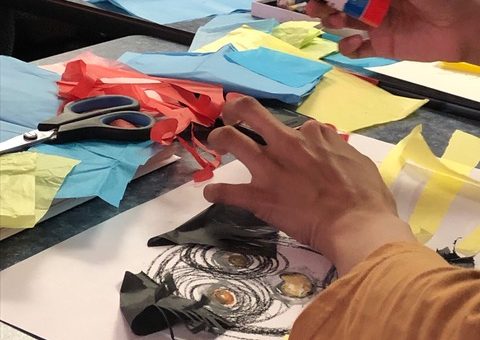Distance Learning Program
Overview

For people living further away from Toronto, we offer a Graduate Level Diploma in Art Therapy Distance Learning (DL) Program. While the majority of the program is delivered online, it includes 176 hours of mandatory in-person, on-campus classroom learning through two 2-week intensive semesters.
As with the onsite program, the DL program includes 3 components: 16-months of accelerated full-time coursework, 600 hours of practicum, and a major research project. Students have up to two years after the last date of coursework to complete the practicum and research project components. Typically, the full program takes approximately 2-3 years to complete.
Most courses in the DL program are delivered asynchronously through an online learning platform, where students access weekly course materials and participate in learning through recorded lectures, videos, readings, discussion forums, and sharing of reflections and artwork. A number of courses are delivered synchronously via Zoom, including the Group Art Therapy Experiential course throughout the 16 months of coursework.
Both onsite and distance learning programs at TATI are cohort-based. This means that each cohort of students progress through the 16 months of coursework together.
The DL program is offered once per year (January start date), and we accept up to 15 students in each DL program cohort.
Through a curriculum that includes a wide range of topics, we offer training for students to integrate art practices with theories and skills in psychotherapy with individuals, groups, adults, children, youth, older adults, couples, families, and diverse communities.
The TATI curriculum is delivered by art therapists, mental health practitioners and scholars with a diversity of experiences and outstanding contributions in their fields, as well as a shared commitment to ethical practices and social transformation in therapeutic arts-making. The program emphasizes arts-based collaboration and self-reflexivity in practice and research, grounded in critical reflection and application of theories. Students and the teaching team (instructors, supervisors, research advisors) actively co-create supportive learning environments both in the classroom and in the field, engaging in knowledge production and capacity-building that foster professional advancement, personal growth, as well as contribution to community well-being.
The TATI Graduate Level Diploma in Art Therapy Programs are recognized by the College of Registered Psychotherapists of Ontario (CRPO) for both the academic and clinical experience (practicum) components. Completion of the TATI program meets the education requirement for registering with the CRPO. Please see here for further information on CRPO application and registration requirements.
TATI is also an approved training program by the Canadian Art Therapy Association (CATA). Students may join CATA for student membership. Graduates from TATI may apply for professional membership. With the completion of additional requirements, professional members may also apply to become registered members of CATA. For more information about CATA membership types please see the association’s website.
Residency: Students must be residing in Canada for the duration of enrollment in the program due to limitations with providing liability insurance for practicum placements outside the country. The Distance Learning program is intended for students who live at least 100km from our campus in Toronto, who cannot attend Saturday classes for religious reasons, or who have accessibility needs that make attending weekly onsite classes infeasible.
International students: At this time, we are regrettably not able to accept applications from international applicants. For more information please see the following notice: https://tati.on.ca/distance-learning-program/#InterInfo
Distance Learning students are responsible for securing their own transportation to and accommodations in Toronto, and the costs of these, for the onsite intensive semesters.
Info Sessions:
Online information sessions are held before each application deadline and are hosted by TATI instructors & staff to share information about art therapy, the TATI program, and application process, and to answer questions.
Past Info Session
September 2026 Onsite Program Admissions
Friday January 30, 2026
12:00-1:30 ET via Zoom
The next online information session will be hosted towards the end of May 2026 ahead of the application period for January 2027 distance learning program admissions. Please check back closer to then for further details/ to register to attend.
Distance Learning
Curriculum
For further details including course descriptions, please see the Distance Learning Program Calendar.
Tuition and Fees
Tuition Fee: The total tuition for the program is $18,800.00.* Tuition is paid in four installments, each in the amount of $4,700. Tuition payments are due at the beginning of each 4 month quarter of the 16 months of coursework.
*The above tuition fee amount is effective as of January 2025. It does not affect the tuition fee for students enrolled/beginning program sooner than January 2025.
Major Research Project Advisement Fee: An additional fee of $1,300.00 is required when students begin their major research project, usually at the end of coursework.
Program Extension: The completion due date of all practicum hours and the major research project is 2 years from the last day of semester 5. If students do not maintain contact with the program and progress in practicum and/or major research project after coursework, and the two-year completion due date has passed, the student will be recorded as inactive in the program. If at or after this time the student would like to continue practicum and/or major research project, they must pay a fee of $200 in order to reinstate their active student status in the program. For details please see Current Student & Alumni.
The Toronto Art Therapy Institute is registered as a career college under the Ontario Career Colleges Act, 2005 and receives no government funding. Tuition fee paid is eligible for the T2202 tuition certificate.
We are not registered with the Ontario Student Assistance Program (OSAP).
Important Dates
2026-2027 Admissions
- Applications for our Onsite Program (September 2026 start date) will be accepted between February 2-27, 2026
- Applications for our Distance Learning Program (January 2027 start date) will be accepted between June 1-26, 2026
- Applications for our Onsite Program (May 2027 start date) will be accepted between October 5-30, 2026
The deadline to open an application file is 7 calendar days before the application deadline, and applications must be completed by 12pm (noon) ET on the closing date of each application period.
Due to our review timeline and process we do not accept late applications. Incomplete applications are kept on file for one year and can be transferred over for completion during another admissions period within the year, by request.
Prerequisites and Application Process
Testimonials
Thanks so much for everything… I am currently making a living as an art therapist at 6 different worksites (including groups and individual sessions with people with addictions, brain-injured clients, survivors of domestic violence, children and teens who have witnessed domestic violence, and people with severe mental illness) and I am always looking to expand my practice — I am currently proposing seniors groups at the various local retirement homes. I’m working in Lindsay, Sutton, Port Perry and Port Hope.
I cannot tell you what a difference my time at TATI has made in my life, and how grateful I am to you, and to all my instructors and supervisors.
I am so proud to say that I am an art therapist.
In 2013 The Ontario Ministry of the Attorney General awarded me a Victim Services Award of Distinction for textile art project with survivors of domestic violence in Kawartha Lakes.
Annalisa Danowski
DTATI
International Students
Important update: TATI is not able to accept applications from international applicants until further notice, due to a federal government decision in January 2024 regarding the cap on international study permits. For more information please click here to read our notice.
Language Requirements:
If you apply to either the On-Site or Distance Learning programs at TATI, TATI reserves the right to request a successfully completed language proficiency test. Language test scores are reviewed in combination with academic credentials to determine your admissibility to TATI.
You may meet our English-language requirements if you have successfully completed one of the following:
TOEFL: Test of English as a Foreign Language
- Computer: 220
- Paper: 560
- iBT: 83
IELTS: International English Language Testing Service
- Score in Academic: 6.5
Degree Equivalency Certificate
If your degree was completed outside Canada, the United States, or the United Kingdom, we require a degree equivalency certificate from an organization such as WES or ICAS. Transcripts from academic institutions outside of the above countries without equivalency certificates will not be processed.
International Credential Assessment Service of Canada (ICAS): www.icascanada.ca
World Education Services (WES): www.wes.org/ca

Practicum
As with the on-site program, students are required to complete 600 hours of practicum and a major research project in order to qualify for graduation.
